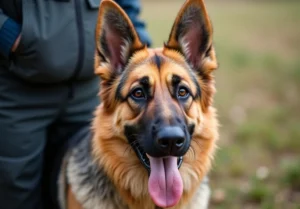German Shepherds are more than just pets; they are unwavering protectors and smart companions. With their remarkable loyalty and intelligence, they forge deep connections with their families, making them one of the most sought-after dog breeds.
The German Shepherd is an ideal choice for anyone seeking a devoted and clever companion who excels in both protection and companionship. There’s a wealth of insights and tips waiting for you below that will help you understand these magnificent dogs even better.

1. History of the German Shepherd
The German Shepherd breed has a fascinating history rooted in Germany’s late 19th century. Originally bred for herding and protecting sheep, these dogs emerged from the efforts of a German cavalry officer, Captain Max von Stephanitz. His vision was to create an intelligent, strong, and versatile dog that could handle various tasks on the farm. He began by selecting the best characteristics from existing herding breeds, combining traits that enhanced both physical ability and trainability.
As industrialization swept through Germany, the need for herding dogs diminished, but German Shepherds found new roles in police and military work. Their keen sense of smell, loyalty, and intelligence led to their use in various tasks, including search-and-rescue operations and as service dogs. After World War I, their popularity skyrocketed globally, especially in the U.S. Here, they became known not only for their working ability but also for their capabilities as fantastic family pets.
Today, the German Shepherd stands as one of the most respected breeds worldwide, known for their versatility, intellect, and unwavering loyalty. Their journey from herding dogs to companions and protectors has created a legacy that many dog lovers cherish.
2. Temperament and Personality Traits
A German Shepherd is the epitome of loyalty and protective instinct. This breed is known for its confidence, making them excellent guardians for families and property alike. German Shepherds are naturally wary of unfamiliar people, which can be an asset in providing a sense of security. However, with proper socialization and training, they can distinguish between a genuine threat and a friendly visitor.
The intelligence of a German Shepherd is remarkable. Ranked amongst the most trainable dog breeds, they’re eager to learn and thrive on mental stimulation. This characteristic not only makes them suitable for various working roles but also enables them to become fantastic family companions. They need engagement through play or training sessions to keep their minds sharp, preventing boredom, which can lead to undesirable behaviors.
Besides loyalty, these dogs form strong bonds with their families. They often exhibit affection towards their owners and can be quite playful. Whether it’s a game of fetch or simply lounging around, their presence adds joy and companionship. It’s essential to ensure they get plenty of exercise and social interaction to maintain their well-rounded personality.
Key personality traits include:
- Loyalty: Fiercely protective of their families.
- Intelligence: Highly trainable and quick learners.
- Confidence: Naturally self-assured, making them excellent watchdogs.
- Energetic: Requires regular exercise and mental challenges.
Understanding these traits helps you nurture a German Shepherd into a well-balanced companion that’s both a devoted protector and an intelligent friend.
3. Nutrition and Diet Needs
Keeping your German Shepherd healthy hinges on a solid foundation of good nutrition. They’re a breed that demands quality over quantity. Start with a high-quality dog food that’s specifically formulated for large breeds. These foods often have the right balance of protein, fats, and calories to support their unique structure and metabolism.
Pay attention to the protein content—look for sources like turkey, chicken, or lamb as the first ingredient. Ideally, aim for a food with at least 20-30% protein and 8-15% fat to ensure they get the energy they need without packing on extra pounds.
Age matters , too. Puppies require more calories than adults because they’re in a crucial growing phase.
- A general rule of thumb is that puppies need around 2-3 times the energy of adult dogs on a per-pound basis.
- For example, if an adult German Shepherd weighs 75 pounds and requires about 1,800 calories per day, a puppy of the same breed may need 2,500 – 3,600 calories per day for optimal growth.
A puppy formula can support their rapid growth, but once they hit about 12 months, transition to an adult formula to prevent obesity.
Don’t forget about supplements like omega fatty acids to promote healthy skin and coat. Some owners also add glucosamine for joint health, especially as their Shepherd ages.
Watch their weight closely, as German Shepherds can be prone to obesity. Regular portion control and monitoring their body condition score can keep them in shape. Last but not least, don’t overlook the importance of fresh water—always ensure they’ve got access, especially after exercise.
4. Training Essentials for Success
Harnessing the intelligence of a German Shepherd requires an approach that blends patience with a clear understanding of their needs. This breed thrives on engaging and mentally stimulating training. Start with positive reinforcement; reward-based training methods work wonders. Treats, praise, or toys can motivate them to learn commands quickly.
Basic obedience training should commence early on—think foundational commands like “sit,” “stay,” and “come.” German Shepherds enjoy tasks and challenges, so incorporating fun activities such as agility training or scent detection can be great for them.
Consistency is key; try to train them at the same time each day. Keep sessions short and lively, ideally around 15-20 minutes. This helps maintain their focus and keeps training enjoyable.
Socialization is just as crucial. Exposing them to various environments, people, and other animals helps prevent behavioral issues down the line. Consider enrolling in group classes where they can learn while interacting with peers.
Unique to these intelligent dogs, utilizing their herding instincts in training can set you up for success. Engage them in activities that mimic herding behaviors, which can be both rewarding and enjoyable for them. This not only provides mental stimulation but also strengthens the bond between you and your canine companion.
By building a training routine that capitalizes on their strengths, you’re not just teaching them commands—you’re enriching their lives and enhancing your companionship.
5. Exercise Requirements
German Shepherds thrive on physical activity and mental challenges. These dogs aren’t just big; they’re full of energy and need 1 to 2 hours of exercise each day. A mix of structured activities and playtime keeps them stimulated and happy.
Taking them on long walks, running, or cycling can do wonders. Agility training or obedience classes are also great choices since they engage both body and mind. Don’t forget to include interactive games like fetch or tug-of-war. These not only keep them physically active but also strengthen your bond.
To really engage their instincts, try incorporating herding exercises. Even if they’re not working dogs, they love to chase and gather. Swimming is another fantastic way to exercise without overstraining their joints. Look for dog-friendly pools or beaches where they can splash around.
Beyond just burning energy, consider mental stimulation as part of their exercise routine. Puzzle toys and scent games are perfect for keeping their clever minds occupied. A tired German Shepherd is a happy one, so mix up the routine to keep things fresh!
6. Grooming and Care Tips
The grooming needs of a German Shepherd go beyond the basics. With their thick double coat, frequent brushing is essential. Aim for at least 2 to 3 times a week, but you may need to increase this during shedding seasons. Use a slicker brush or a de-shedding tool; both work great to remove dead hair and minimize those tumbleweeds around your house.
Bathing should happen every two to three months or as needed. Always use a dog-safe shampoo to keep their coat healthy and avoid skin irritation. Don’t forget to check their ears regularly for dirt or wax buildup, as German Shepherds can be prone to ear infections.
Make toe-trimming a regular habit, as their nails can grow quickly. If you hear clicking on hard surfaces, it’s time for a trim.
Here’s a quick checklist for their grooming routine:
– Brush: 2-3 times per week
– Bath: Every 2-3 months
– Nail trim: Monthly or as needed
– Ear check: Weekly
Lastly, a well-fed pup is a happy pup. Make sure they’re on a balanced diet suited for their age and activity level. Proper nutrition will enhance their coat health and overall energy.
By keeping up with these grooming and care tips, you’ll ensure your German Shepherd stays looking and feeling their best!
7. Health Issues to Monitor
German Shepherds are robust dogs, but they can be prone to specific health issues. Early detection is key. Keep an eye out for hip and elbow dysplasia, conditions caused by abnormal joint formation that can lead to arthritis. Regular check-ups and vet visits will ensure any discomfort is addressed promptly.
Monitor for Gastrointestinal issues too, as German Shepherds are susceptible to bloating, which can be life-threatening. Signs include an enlarged abdomen and excessive drooling.
Another area to keep tabs on is degenerative myelopathy. This progressive disease affects the spinal cord and can lead to mobility issues. Keep an eye out for any changes in gait or coordination.
Lastly, be aware of skin allergies. German Shepherds often have sensitivities that can manifest as itching, rashes, or ear infections. Regular grooming and a quality diet can help limit these problems.
Regular vet visits, alongside these observations, can ensure your loyal companion remains healthy and happy.
8. Fun Facts About German Shepherds
German Shepherds are not just known for their loyalty and protective instincts; they have some truly fascinating qualities. For instance, they are exceptional learners, often ranked among the top three most intelligent dog breeds. They thrive on mental and physical stimulation, making them eager learners in obedience and agility training.
Did you know that they can be trained to detect cancer and other diseases? Their incredible sense of smell allows them to sniff out certain health conditions, making them invaluable in medical settings.
And here’s a quirky tidbit: German Shepherds can be quite the performers. They’ve been featured in countless movies and television shows, often portraying characters with high intelligence—think of Rin Tin Tin and K-9!
These dogs also have a unique “talking” ability. They can learn to mimic sounds or even “talk” by making vocalizations that resemble human speech patterns, which can be quite amusing!
Whether as companions or working dogs, German Shepherds certainly live up to their reputation, blending loyalty, intelligence, and a bit of pure charm.
9. Building a Strong Bond with Your German Shepherd
Establishing a solid connection with your German Shepherd isn’t just about sharing a home; it’s about creating a deep, trusting partnership. These intelligent, loyal dogs thrive on interaction and mental stimulation. To strengthen your bond, consider these actionable tips.
Invest time in training. German Shepherds excel in obedience and are eager to please. By engaging in positive reinforcement training, you not only teach useful commands but also build mutual respect. Keep training sessions fun—shorter 10-15 minute sessions work best—and rewarding. That sense of achievement can forge a tighter bond.
Daily exercise is essential. German Shepherds have high energy levels and need regular physical activity. Whether it’s a brisk walk, a jog, or an engaging game of fetch, make sure you’re active together. This time outdoors fosters shared experiences while keeping them healthier and happier.
Engage in playtime. Interactive play isn’t just entertaining; it’s a critical component for strengthening your relationship. Use toys that require teamwork, like tug ropes and fetch balls. This builds trust and helps them learn how to cooperate with you.
Practice relaxation techniques. Just like humans, dogs benefit from calm moments. Create a routine where you both relax together—maybe a quiet evening where you pet them while watching TV or reading. This downtime can enhance your bond, giving them a sense of security.
Socialize extensively. German Shepherds love interacting with other dogs and people. Arrange playdates or visits to dog parks to foster confidence and ease anxiety. A well-socialized dog is generally happier and more secure, which can greatly enhance your relationship.
Communicate effectively. Take time to observe your dog’s body language and vocalizations. Learning what they’re trying to communicate helps you respond appropriately, strengthening trust. For instance, if they seem nervous, offering comfort and reassurance can deepen your bond.
Create a predictable routine. Dogs thrive on consistency. Establishing a daily schedule for feeding, walks, and play helps them feel secure. Knowing what to expect reduces anxiety and fosters trust in your leadership.
Include your dog in family activities. Involving your German Shepherd in your daily life enriches their experience and reinforces your role as a trusted companion. Whether it’s walking in the neighborhood or hanging out in the backyard, these shared moments build connection.
Consider training classes together. Enrolling in a training class isn’t just about obedience; it’s a chance to bond while learning something new. Classes often provide socialization opportunities, which can be a fun adventure for both of you.
Be patient and understanding. Acknowledge that every dog has its own pace when it comes to bonding. Some may take longer to open up than others. Stay calm and show them love without rushing, and they’ll eventually trust you more deeply.
By focusing on these practical strategies, you’ll cultivate a loyal, trusting connection with your German Shepherd. It’s a relationship built on understanding and shared experiences that flourish over time.
Alex, a passionate animal lover, has experience in training and understanding animal behavior. As a proud pet parent to two dogs and three cats, he founded AnimalReport.net to share insights from animal experts and expand his knowledge of the animal kingdom.




